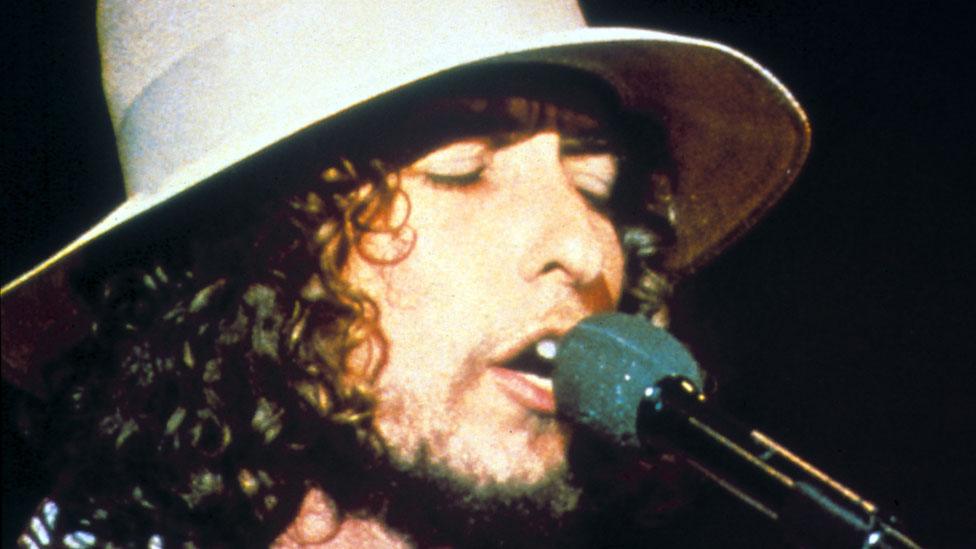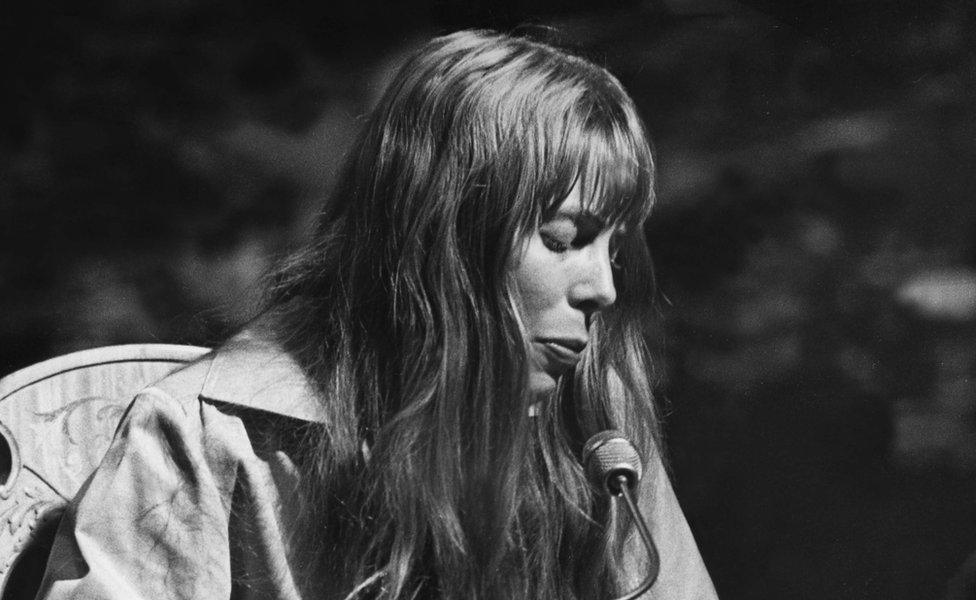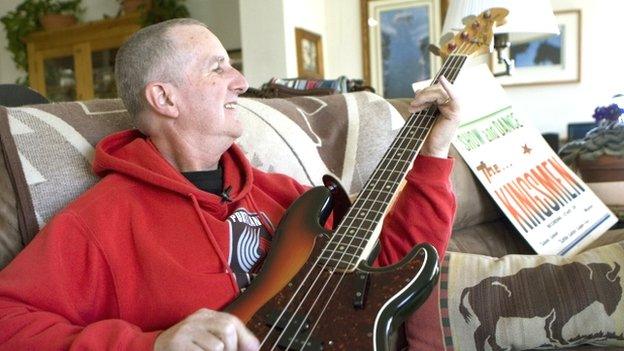Smashed Hits: Forever Young
- Published

Catapulted back into the spotlight as this year's chart-topping X Factor winner's song, Forever Young originally acted as an uncharacteristically direct song by Bob Dylan about his son, Jesse. But it came at an important moment in his career, writes Alan Connor.
By 1972, Bob Dylan seemed to have disappeared.
New York had become, in his words, "a heavy place". In 1966, two big changes had happened - Dylan had crashed his Triumph Tiger motorbike, bringing to an end an unsustainable period of experimental fecundity, and he had become a father.
The Dylans decamped to rural New York state for some peace. They didn't get it. The presence of Bob Dylan gave the tiny town of Woodstock such countercultural kudos that its name was given to an "aquarian exposition" - the famous 1969 festival in a neighbouring county which didn't feature Dylan, but did bring half a million people into his back yard.
For some of them, "Dylan's back yard" was no metaphor, and they never went away. The Dylans soon wearied of finding hippies in the trees around their home and Dylan became frightened that he might have to use his "clip-fed Winchester blasting rifle" to keep them from his family. Onwards, then, to an Arizona ranch.
Dylan took to spending time in the desert, listening to the radio, trying to "forget about things, myself included". But in the absence of the real thing, the music business was keen to promote various "new Dylans", among them Neil Young. In 1972, the acoustic guitar and harmonica of Young's Heart of Gold became inescapable.
Dylan's response was to swear and then pronounce: "That's me! If it sounds like me, it should as well be me." So much for disappearing.
And so he recorded some songs for his first proper album in over three years. Planet Waves was neither psychedelic nor protest - these were tales of married love, nostalgia... and one he'd been working on for a while, a lullaby for Jesse, that son born in 1966. Forever Young.
Some thought the title was chosen as an explicit nod to Neil Young - a hidden message that the real McCoy was back - but Dylanologists have a habit of overworking these connections. Another reference was hiding in plain sight.

Other parent-to-child songs

David Bowie wrote Kooks for his 1971 album Hunky Dory, about his newborn son Zowie
The inspiration behind Abba's Slipping Through My Fingers was the daughter of two members of the group, Bjorn Ulvaeus and Agnetha Faltskog
Joni Mitchell wrote Little Green in 1967 about the daughter she had given up two years previously for adoption
Kate Bush's Bertie is named after her son and appeared on her 2005 album, Aerial

The song opens "May God bless and keep you always / May your wishes all come true". Dylan had poached from the Old Testament for protest purposes since Blowin' in the Wind, but Forever Young's source is more domestic. The Jewish priestly blessing from the book of Numbers begins: "May the Lord bless you and guard you / May the Lord make His face shed light upon you." (The blessing and its gesture also, according to Leonard Nimoy, inspired Star Trek's Vulcan Salute.)
As Dylan songs go, Forever Young is uncharacteristically direct - a father hopes that his child will remain strong and happy as the future brings inevitable trials. He didn't want it to sound "too sentimental", so it was bad luck when the girlfriend of a childhood pal heard him recording it as an acoustic benediction and yelped: "C'mon, Bob: What! Are you getting mushy in your old age?"
Dylan wavered. He recorded another version that was more rock, less lullaby, but was eventually persuaded to include both on the album, one after the other.

This year's X Factor winner, Louisa Johnson
Forever Young is one of Dylan's To Make You Feel My Loves or Knocking on Heaven's Doors - it's simple and easy to cover. Diana Ross has had a go, so has Norah Jones... and so has Neil Young.
In 1988, Rod Stewart released a song with a similar sentiment and similar lyrics. For example, Dylan: "May you grow up to be righteous / May you grow up to be true". Stewart: "May you grow to be proud, dignified and true." Perhaps if Stewart hadn't actually called it Forever Young, he might not have had to share its royalties.
It's also conveniently appropriate for this year's X Factor winner, 17-year-old Louisa Johnson. Music fans have long worried about classic songs getting besmirched by the talent show, but it's worth recalling that Forever Young was used in a multimillion-dollar Pepsi ad during the 2009 Super Bowl. Spliced footage depicts the young Dylan handing his shades to will.i.am, as if passing the mantle of generational spokesperson to the man behind Shut Up and My Humps.
And if the connection seems tenuous, we can assume it had the blessing of will.i.am's friend Jesse Dylan, who has directed ads for Snickers, Nintendo and Pizza Hut - as well as will.i.am's 2008 promo supporting the Obama campaign.

More from the Magazine's Smashed Hits

Jack Ely, singer with the Kingsmen, has died. He is best known for Louie Louie, a song inspired by the Caribbean which appeared, went away quietly and came back in a form so raucous that the American security services thought it should be outlawed, writes Alan Connor.

Subscribe to the BBC News Magazine's email newsletter to get articles sent to your inbox.